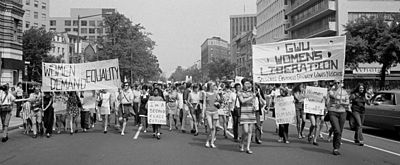Women's liberation movement
branch of radical feminist thought
The Women's liberation movement was a political alignment of women and feminist intellectualism that emerged in the late 1960s and continued into the 1980s primarily in the industrialized nations of the Western world, which affected great change (political, intellectual, cultural) throughout the world.

Quotes
edit- (Women's Liberation) ... is an ontological, spiritual revolution, pointing beyond the idolatries of sexist society and sparking creative action in and toward transcendence. The becoming of women implies universal human becoming. It has everything to do with the search for ultimate meaning and reality which some would call God. p. 6
- Mary Daly in Beyond God the Father: Toward a Philosophy of Women's Liberation (1973)
- It requires a kick in the imagination, a wrenching of tired words, to realize that feminism is the final and therefore the first cause, and that this movement is movement. Realization of this is already the beginning of a qualitative leap in be-ing. For the philosophers of senescence 'the final cause' is in technical reason; it is the Father's plan, an endless flow of Xerox copies of the past. But the final cause that is movement is in our imaginative-cerebral-emotional-active-creative be-ing. p. 190
- Mary Daly in Beyond God the Father: Toward a Philosophy of Women's Liberation (1973)
- If we have no intuition of ourselves as independent, unmediated beings in the world, then we cannot conceive ourselves surviving our liberation; for what our liberation will do is dissolve the structures and dismantle the mechanisms by which Woman is mediated by Man. If we cannot imagine ourselves surviving this, we certainly will not make it happen.
- Marilyn Frye, The Politics of Reality: Essays in Feminist Theory (1983), p. 80
- 1980. I recognized in Reagan's election that the liberalism I had for years seen as the real danger was being superseded, that the right was gaining power, with all its Jew-hating, racist, sexist, homophobic capitalist thrust. At the same time the anti-Semitism I was encountering in the women's movement and on the left hurt me more, not because it was more threatening but because the feminist left was where I needed to be: this added to my sense of isolation as a Jew.
- Melanie Kaye/Kantrowitz To Be a Radical Jew in the Late 20th Century in The Tribe of Dina: A Jewish Women's Anthology (1986)
- The way Jews have been met with "not you too," the way anti-Semitism becomes the one issue too many, suggest that many white women are angry and resistant to dealing with racism but are too frightened to express that anger openly; suggest further how little our movement has taught us to see struggles against racism as life-giving, nourishing; as our own.
- Melanie Kaye/Kantrowitz To Be a Radical Jew in the Late 20th Century in The Tribe of Dina: A Jewish Women's Anthology (1986)
- By speaking about anti-Semitism, Jewish women unsettle an unspoken equation in the radical women's movement: in a society like ours, deeply racist and absurdly pretending to classlessness, class comes to be seen as identical to race. People of color are considered the same as working and poor people.
- Melanie Kaye/Kantrowitz To Be a Radical Jew in the Late 20th Century in The Tribe of Dina: A Jewish Women's Anthology (1986)
- Only the fresh revolutionary storms were strong enough to sweep away hoary prejudices against woman and only the productive-working people is able to effect the complete equalization and liberation of woman by building a new society.
- Alexandra Kollontai, The Autobiography of a Sexually Emancipated Communist Woman (1926), Translated by Salvator Attanasio, Herder and Herder, 1971.
- The emancipation of women is not an act of charity, the result of a humanitarian or compassionate attitude. The liberation of women is a fundamental necessity for the Revolution, the guarantee of its continuity and the preconditions for its victory.
- Samora Machel, "The Emancipation of Women" (1973)
- The revolutionary Chicana does not identify with the so-called women's liberation movement in the United States because up to now that movement has been dominated by white women of middle class background...Up to now, the U.S. women's liberation movement has been mainly concerned with sexism and ignored or denied the importance of racism. For the Chicana, the three types of oppression cannot be separated. They are all a part of the same system, they are three faces of the same enemy.
- Elizabeth Martinez "La Chicana" (1972) from Ideal, September 5-20, 1972: pp. 1-2. Anthologized in Chicana Feminist Thought: The Basic Historical Writings
- I think the women’s movement is wonderful, a great thing. I hate to see some of the mean struggles within it, but I don’t see how it could exist without it. Everybody should try to be as honorable and truthful and fierce as they can be.
- Grace Paley Interview with Boston Review (1976)
- That word identity has been hard for many women who live secular lives and maybe harder for religious women and also feminists. But the women's movement has made a big difference. I don't know who it hasn't helped in this world. It's given a lot of Jewish women courage to stay Jewish and fight.
- Grace Paley Interview (1985) in The Tribe of Dina: A Jewish Women's Anthology edited by Irena Klepfisz and Melanie Kaye/Kantrowitz
- There’s hardly a woman writer who doesn’t receive some kind of support from the women’s movement. We’re very lucky to be living and writing now.
- Grace Paley Interview with The Paris Review (1992)